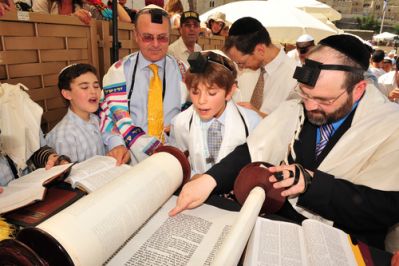 If you’ve ever attended a b’nai mitzvah celebration, you’ve probably witnessed a young person going through many important rituals: blessing the Torah, reciting prayers, or giving a speech about the weekly Torah reading. As you may imagine, this coming-of-age ritual requires a lot of preparation before the ceremony takes place. That preparation is central not just to the celebration but also to the idea of coming of age for many young Jewish people.
If you’ve ever attended a b’nai mitzvah celebration, you’ve probably witnessed a young person going through many important rituals: blessing the Torah, reciting prayers, or giving a speech about the weekly Torah reading. As you may imagine, this coming-of-age ritual requires a lot of preparation before the ceremony takes place. That preparation is central not just to the celebration but also to the idea of coming of age for many young Jewish people.
Making Time for Preparation
Boys usually prep for bar mitzvah, while girls get ready for bat mitzvah. They translate as “son of commandment” and “daughter of commandment” respectively. Plural forms include “b’nai mitzvah,” which is also sometimes used for Jewish youth who identify other than male or female.
B’nai mitzvah celebrations can take place close to one’s 12th or 13th birthday, but My Jewish Learning emphasizes that some flexibility is needed to accommodate school schedules, extracurricular activities, and family obligations. Also, out-of-town relatives may not wish to travel on the Sabbath. Planning out these details is one matter, but Rabbi Rachel M. Solomin advises parents to work with their children to develop a reasonable preparation timetable. Prep activities can be completed well in advance before scheduling the ceremony itself.
Jewish Education and B’nai Mitzvah
Religious education is an important component in preparing for b’nai mitzvah. As ReformJudaism.org recommends, many Jewish children start their learning in synagogue religious schools several years before their ceremonies. This schooling provides the important groundwork for b’nai mitzvah, including how to lead and take part in worship. Both classroom and hands-on training are essential for activities such as leyning, the ritualistic chanting of Tanakh passages during worship.
However, Jewish religious education is also meant to achieve greater objectives. In many communities, that includes an understanding of Jewish history and culture, studying the Torah, and observing the commandments. Other key goals including helping students develop a sense of ethics along with cultivating a reverence for and relationship with God.
While synagogue education helps build a foundation, it can be accompanied by tutoring in the months before a b’nai mitzvah ceremony. Both independent tutors and organizations offer Torah tutoring services, which are either conducted in person or with technologies such as Skype.
The Importance of Mitzvah Projects
Jewish religious education provides theory and some practice before young people attain b’nai mitzvah. Another element is the mitzvah project, which helps an individual gain a deeper understanding of a specific commandment. The Torah contains 613 commandments, offering many options from which one can choose, and Chabad suggests selecting a mitzvah related to one’s interests, talents, or passions. Mitzvahs tend to fall into two broad categories: those between an individual and God, and those between an individual and other people.
After a young person has selected a mitzvah, the real work begins. Learning about the mitzvah is the next step, which can be done through reading the Torah and other resources, and the chief goal is to understand its meaning and significance in Judaism. B’nai mitzvah candidates also express what their mitzvahs mean to them by creating their mitzvah projects. There are endless project possibilities: creating artwork or literature, researching and sharing knowledge in presentations, or finding ways to serve others in need. A project about “chesed” or kindness, for instance, could involve volunteer work or designing a mobile app that helps others fulfill an important need.
Knowledge and Action Are Powerful
Coming of age involves learning critical lessons. For Jewish youth, knowledge is a vital concept in getting ready for the b’nai mitzvah. At the same time, the need to put those lessons into practice is also emphasized. After all, adults must possess both the capacity to learn and the ability to act in wise, ethical, and beneficial ways.
Add Your Comment